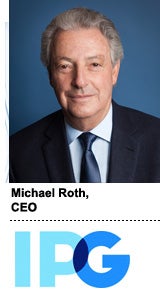IPG beat the holding company sector in Q2 with a strong organic net revenue YoY increase of 4.6% to $1.95 billion.
Meanwhile, Omnicom and Publicis, which reported Q2 earnings last week, were down 0.9% and 2.1%, respectively. WPP has not reported Q2 earnings yet, but saw just 0.8% growth in Q1.
IPG is raising its growth target for the year from 2-3% to 4-4.5%. The company’s stock was up 5.5% at market open.
“We’re proud of our results,” CEO Michael Roth said on the earnings call Tuesday. “Organic growth is an encouraging signal that certain marketers have in fact returned to growth mode in their engagements with us.”
So why is IPG growing while its peers struggle?
First and foremost, IPG is doing well on the new business front, with Converse, Revlon, Estée Lauder and Godiva added to the roster as new clients going into the second half of the year.
But, perhaps more importantly, existing clients are starting to spend again.
“We did see a return to growth in our top 20 clients,” Roth said. “We haven’t seen a return at the growth rate we’re seeing in new business … but the spend of top 20 clients on a global basis is the bread and butter of our business, so we’re pleased.”
Among those clients returning to spend are CPGs which did “not show a huge improvement, but … was positive for us in the quarter both worldwide and in the US,” Roth said, adding that food and beverage and retail are still cutting spend.
IPG may also have a leg up over competitors because it began turning around some of its struggling agency networks earlier than its peers, said Pivotal analyst Brian Wieser, noting that McCann, MullenLowe and FCB have all rebounded.
“There’s a cyclicality to the industry and typically that’s more at the business unit level than the holding company level,” Wieser said. “They don’t really have any broken businesses at this time.”
Struggling creative agency networks at other holding companies, especially Publicis Groupe, could also be making room for IPG to gain market share, he added.
“You can argue competing creative agency networks only really started to struggle in recent years,” Wieser said. “If you fell down first and you started picking yourself up earlier, you make it back to standing up as you were. The others might be slouching a little bit.”
The AMS Card
Another reason IPG was standing a bit taller in Q2: the agency network’s strong position on transparency, Roth said, which will be enhanced by its $2.3 billion purchase of Acxiom Marketing Solutions (AMS) in July. The transaction is expected to close in early Q4.
“Managing data at scale has become an essential part of our position,” Roth said. “Acxiom brings decades of expertise and the best talent in the industry with ethical standards in how they gather data and respect consumer privacy. This transaction will position our company for the next decade of data-driven marketing ahead of our peers, as well as new entrants in our space.”
Roth didn’t go into much detail about IPG’s strategy for Acxiom, but did say it will start deploying its services for media first and then expand out to the rest of the network over time. He also said both companies are already getting inbound calls on future media-related opportunities.
“The Acxiom business is strong and healthy and we want to keep it that way,” he said. “Our existing clients are excited to see what we can bring to the table. On the IPG side, all of our agencies are calling in to see how they can work with AMS to enhance opportunities, and on some new business pitches we see opportunities where we can pitch together and add value.”
Roth also called out the group’s open architecture model, which was established 12 years ago to pull talent from different agencies across the network to meet client needs, as a reason for IPG’s success.
“We recognize the culture of each of our brands, yet we … bring them in on a collaborative basis to be very client-centric,” he said. “That’s the mantra of all of IPG, and frankly, it’s been working in the marketplace. We didn’t have to restructure our entire organization.”














